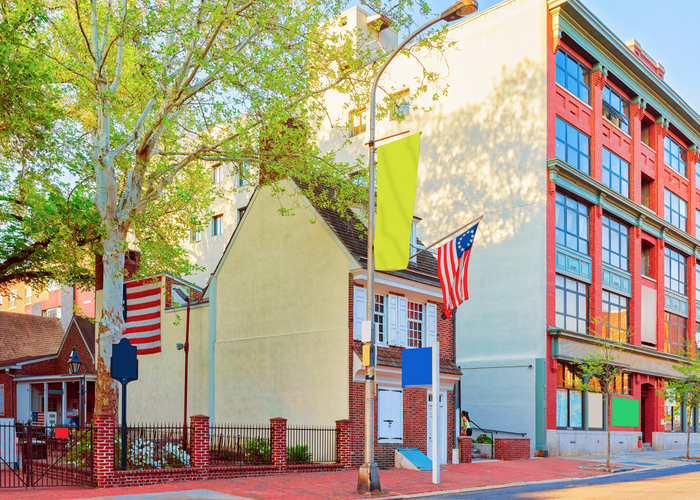Philadelphia Ranks Third With the Most Historical Homes

Pennsylvania is in the top five states with the most registered historic homes in the country, according to a recent study released by AssuranceIQ. The study analyzed data from the National Park Service’s National Register of Historic Places to discover which U.S. cities and states have the most registered historical homes.
The commonwealth ranked No. 4, with 3,556 homes, along with two other states in the original 13 colonies including New York, which topped with the list with 6,416 homes and Massachusetts with 4,462, followed by Ohio with 4,180.
“Pennsylvania is home to several cities which are rich with beautiful historic homes that showcase a variety of architectural features. Our state played a key role with the birth of our country and we’re fortunate to have preserved so many of these historical properties. It’s like seeing the history books come to life!” said PAR President Al Perry.
Holding the third spot on the list of U.S. cities with the most historical homes was the City of Brotherly Love, which once served as our nation’s capital, which has 608 homes. Historical homes in Philadelphia offer a view of how some of our founding fathers lived, along with other national treasures like the Betsy Ross House, Cliveden and the Powel House.
Within Pennsylvania, Lancaster is the city that exceeds the others with the most historical homes with 137.50 per 100,000 residents.
Kate Long, consumer financial wellness advocate at Assurance IQ, said, “Owning a historic home can be like owning a piece of history. The value of the home’s cultural significance, such as unique architectural features or the history that took place there, might outweigh the financial considerations for you. In that case, just make sure you fully understand the implications from an insurance, repairs, maintenance and mortgage standpoint before you proceed. And don’t forget, you may be eligible for special loans or mortgage rates if you promise to maintain or rebuild a historic home.”
Long noted that people often buy historic homes because of their unique character and charm, but there are special considerations buyers of historic homes should keep in mind.
“A historic home might need a lot of work done upfront and that work might be very costly,” she said. “For example, you might need to replace plumbing or electrical systems that were in use for decades. Or you may need to invest in restoration to maintain the home’s historical finishes. If the house is made of hard-to-find materials, it could cost a lot to make repairs.”
Additionally, she noted, that an older home may have an official designation that subjects it to certain local or federal preservation rules.
“For example, if a famous person lived there, the house could have an official historic designation from the National Park Service. Preservation rules could restrict certain modifications, or require a certain standard of upkeep,” Long said. “Pennsylvania has the fourth most registered historic homes in the US. So, make sure you check local laws in the town or county you’re buying in to confirm what’s allowed.”
In addition to the maintenance and repair costs, don’t forget to consider the cost of insurance during the buying process, according to Long. “Many older homes aren’t covered by standard homeowners insurance. This is because updates and rebuilding could cost more than the home’s market value.”
Long added, “Because each insurance company weighs certain risks differently, it’s important to shop around and get quotes from multiple insurers. If one company declines to cover your home, or the price is too high, another might have a policy option for you. But keep in mind that a low monthly premium doesn’t necessarily mean the coverage is right for you. It’s important to find a policy that fits your needs and covers what matters most to you. Speaking with an agent who sells insurance from multiple carriers can help streamline this process. The agent can ask you the right questions and guide you to a policy that suits your situation.”
Topics
Share this post
Member Discussion
Recent Articles
-
Estimated Closing Costs: How Mandatory Are They, Really?
- November 22, 2024
- 5 min. read
When do you have to give estimated costs? Can you use estimated costs developed by others? Let’s hit a couple of common Legal Hotline questions about the details of estimated closing costs.
-
Tri-County Realtor® Leads Efforts to Fight Hunger
- November 21, 2024
- 2 min. read
Heather Griesser-LaPierre, a member of Tri-County Suburban Realtors®, led an initiative last month to pack 238,000 meals for hurricane victims alongside fellow Realtors® and other volunteers.
-
9 Tips to Save Money When Moving
- November 20, 2024
- 3 min. read
For new homeowners, moving costs can add up quickly. Here are nine tips to keep moving costs down, from Point2.
Daily Emails
You’ll be the first to know about real estate trends and various legal happenings. Stay up-to-date by subscribing to JustListed.



